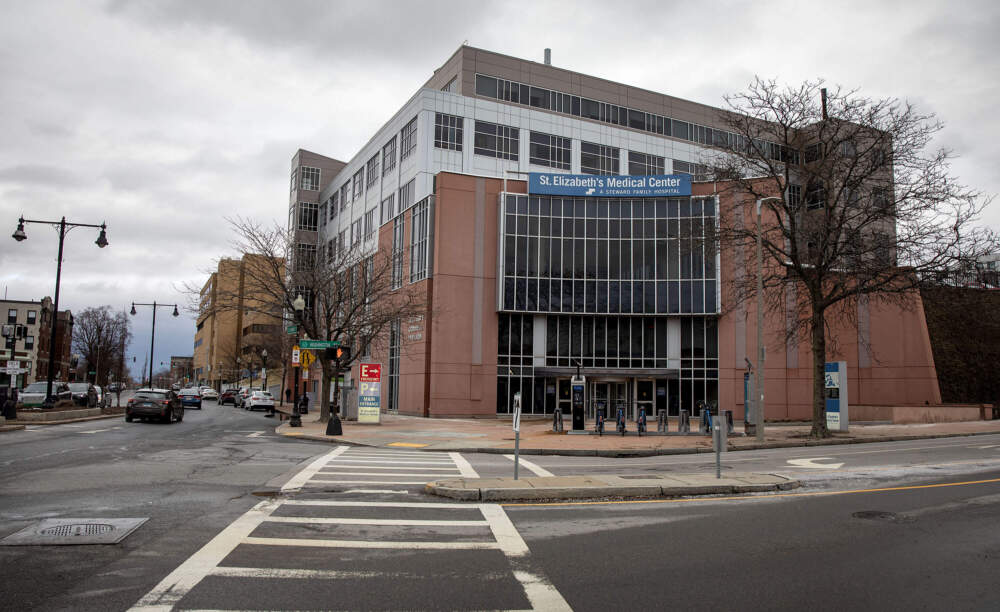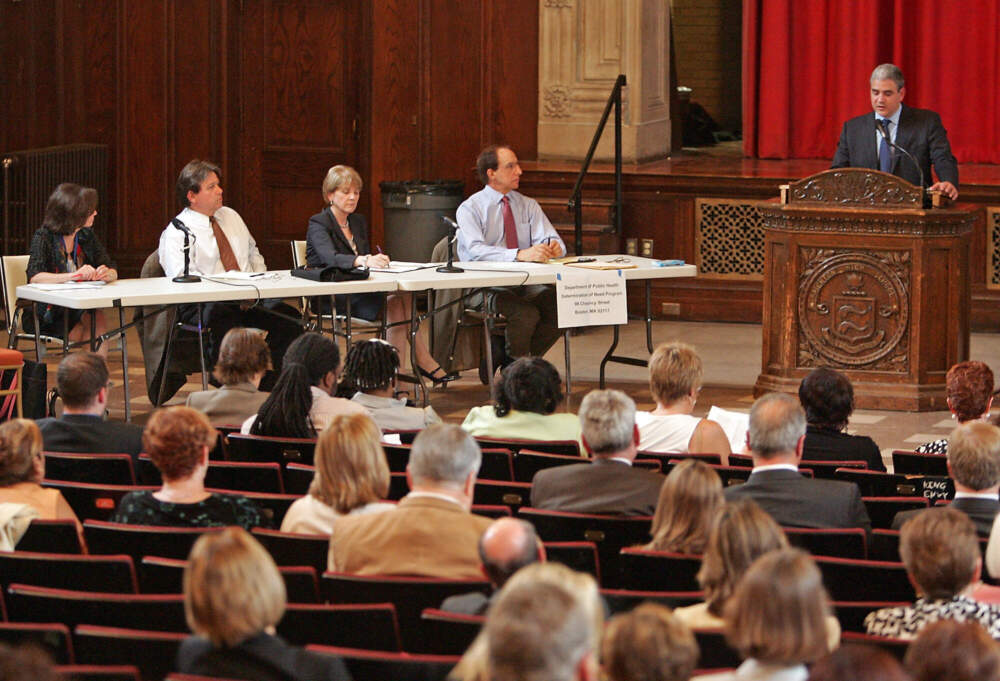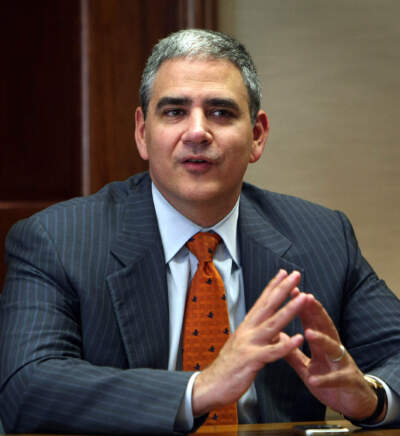Advertisement
How Steward Health Care went from hospital savior to the precipice of failure
In 2010, a group of hospitals controlled by the Archdiocese of Boston was struggling. Public officials, health care leaders and community members worried about the facilities' future.
The chief executive of the Catholic hospital network, Dr. Ralph de la Torre, proposed an idea. He engineered a deal with a New York private equity firm to start a new company, Steward Health Care, acquire the Caritas Christi hospitals, and preserve essential access to health care for people in and around Boston, particularly low-income families.
Nearly 14 years later, part of that story, in a sense, is repeating itself. But this time, it's Steward that is in trouble. The company blames meager payments from public insurance programs for causing severe financial challenges that jeopardize its ability to provide services.
On Friday, Steward leaders said they secured a deal to stabilize operations and keep their Massachusetts hospitals open for now. They said they will consider transferring ownership of one or more hospitals to other companies.
The update brought some relief. Still, state health officials say they're closely monitoring Steward's hospitals, and the company's future in Massachusetts remains cloudy.

From Steward's founding, many people were cool to the idea of a private equity takeover of a chain of nonprofit hospitals. The concerns ranged from the immediate to the long-term: Would the company's turnaround plan work? Would it use its market power to demand higher insurance payments, driving up health care costs? Would the private equity investors squeeze the hospitals for profit and leave? Would they even keep the hospitals open?
“People were concerned about the Catholic nonprofit system being sold to a for-profit aggressive investment firm,” said John McDonough, professor at the Harvard T.H. Chan School of Public Health. “But there didn't seem to be any other viable choices on the table.”
Then-Attorney General Martha Coakley ultimately greenlit the deal in October 2010. She required that Steward keep all the Caritas Christi hospitals open, at least temporarily.
“The failure to do something to save Caritas would have been a disaster," Coakley told The Boston Globe in 2011.

De la Torre declared a vision for Steward far more ambitious than rescuing a group of struggling hospitals. He said he was creating a new model for community-based health care, in which doctors work together to help patients stay healthy.
“My goal is to fix health care,” de la Torre told the Globe at the time.
The Steward experiment launched within months of the passage of the Affordable Care Act, often known as Obamacare, which expanded insurance coverage nationwide and encouraged health care providers to focus on providing higher quality care.
In interviews with journalists, de la Torre insisted that Steward’s business plan was on track. But there were early signs of distress.
Records show the company was suffering heavy operating losses: $75 million in 2014, according to a report from then-Attorney General Maura Healey in 2015, the end of the state monitoring period over the Steward deal. Healey also noted Steward had concerning amounts of debt.
Around the same time, Steward executives also shuttered Quincy Medical Center — breaking their promise to keep it open. They later closed the family medicine training program at Carney Hospital, and the labor and delivery unit at Morton Hospital, among other unit closures.
“We had started to build something for the community, and that’s gone,” one Carney resident physician lamented when the training program closed in 2016.
Expansion was always part of Steward’s plan. From its early days, the company hired doctors away from competing Massachusetts medical groups and worked aggressively to keep patients in its network.
But de la Torre’s gaze extended far beyond Massachusetts.
A significant turning point came in 2016, when Steward struck a deal with Medical Properties Trust, or MPT, an Alabama-based real estate investment trust. MPT paid $1.25 billion for Steward’s hospital properties, and Steward agreed to lease them back. The deal set Steward up to become a national player. It is also key to the company’s struggles today.
"Massachusetts has put a great amount of time and thought into regulating our health care system, yet somehow this corporation fell through the cracks."
Ellen Lutch Bender
Steward used the proceeds of the real estate sale to pay back Cerberus and to buy hospitals across the country. The expansion was rapid. Steward quadrupled in size, operating 36 hospitals in 10 states: Arizona, Arkansas, Colorado, Florida, Louisiana, Ohio, Pennsylvania, Texas, Utah and Massachusetts.
By 2018, Steward executives had relocated their headquarters from Boston to Dallas. The move took them far from the Massachusetts regulators who were demanding annual financial statements, something required of all hospital operators in the state. Steward has long refused to turn over the documents, arguing they should be kept confidential for business reasons. Steward sued the state to avoid disclosing them.
Meanwhile, the company’s growth continued abroad. A deal to take over hospitals on the European island of Malta ended in turmoil. The Wall Street Journal has reported that in 2020, MPT and de la Torre formed a joint venture to take over Steward's international business.

Countless executives have come and gone from Steward, but de la Torre has been a constant. Amid the COVID pandemic in 2020, he led a group of Steward physicians to take control of 90% of Steward, while MPT retained a 10% stake.
Cerberus — the firm eponymous with the mythological three-headed dog that guards the gates of the underworld — made an $800 million profit on Steward, according to reporting by Bloomberg.
De la Torre, too, amassed wealth enough to buy lavish homes, and reportedly even a $40 million yacht.
Yet, many health care market observers say Steward executives failed to adequately invest in their hospitals.
“Massachusetts has put a great amount of time and thought into regulating our health care system, yet somehow this corporation fell through the cracks,” said Ellen Lutch Bender, a local health care consultant and chief executive of the firm Bender Strategies. “Ultimately, the legacy of Steward Health Care, both here and nationally, will be a very hard lesson on what happens when shareholder profits are put ahead of patients.”
Over the years, Steward stopped paying all its bills, according to lawsuits, news reports and accounts from Steward’s employees and vendors. Numerous vendors have taken the company to court over unpaid bills. Employees have reported running low on basic medical supplies, a result of Steward’s failure to pay its vendors.
In January, MPT, the real estate firm that essentially functions as Steward’s landlord, said Steward was $50 million behind on rent. MPT said Steward would take new steps to try to cover those costs.
MPT’s statements, and reporting from The Boston Globe, triggered an alarm bell for Massachusetts health care leaders and public officials. Behind closed doors, they began talking about what to do in case Steward went into bankruptcy or ceased operating hospitals.
Steward hospitals account for about 8% of patient discharges and 10% of ER visits across Massachusetts, according to data from the state's Center for Health Information and Analysis compiled for WBUR.
Steward officials, for their part, say they have helped local communities by providing care, supporting jobs and paying taxes. They noted that nearly three-quarters of their patients are covered by Medicare or Medicaid, which pay less than private insurers pay for medical services.
“Since rescuing the failing Caritas Christi hospital system from bankruptcy in 2010 — in the process saving 14,000 jobs and 11,000 pensions — Steward Health Care has provided community-based services to the poorest communities in the state,” Steward officials said in a statement this week.
As the Steward story unfolds, it is renewing concerns about the role of private equity in health care.
“The purpose of a health system is to serve the needs of patients and the public,” McDonough said, “and the purpose of private equity is to return massive profits to the small group of owners as rapidly as possible — and then get out of town.
“The goals of private equity versus the goals of what's important in our health system are absolutely at odds with each other.”
